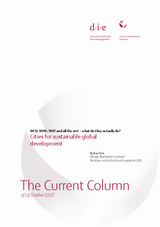The Current Column
WCD, WHD, WUF and all the rest - what do they actually do?
Cities for sustainable global development
Dick, EvaThe Current Column (2018)
Bonn: German Development Institute / Deutsches Institut für Entwicklungspolitik (DIE), (The Current Column of 29 October 2018)
Bonn, 29 October 2018. The theme of this year’s World Cities Day on 31 October is “Building Sustainable and Resilient Cities”. Created by the United Nations in 2013, the day is geared towards stimulating international interest in urbanisation and promoting intergovernmental cooperation in addressing the opportunities and challenges of urban development. There remains ample room for improvement, particularly in respect of the second of these objectives, i.e. cooperation on sustainable urbanisation. It is no coincidence that WCD 2018 makes a direct reference to Goal 11 of the 2030 Agenda for Sustainable Development (“Make cities inclusive, safe, resilient and sustainable”): not only are cities and municipalities often directly affected by the major global challenges – climate change, poverty and violent conflict – but they also have a key role to play in tackling them. Most global migration and refugee movements lead towards urban areas. Cities generate 80 percent of the world’s economic output. They are also responsible for over 70 percent of global greenhouse gas emissions and an equally high share of global energy consumption. The growing importance of cities is also reflected in the self-perception of the “urban community”. For instance, the New Urban Agenda, outcome document of the third UN Conference on Housing and Sustainable Urban Development (Habitat III), emphasizes “the key role of cities and human settlements as drivers of sustainable development in an increasingly urbanized world” (NUA, Article 22). Helping to shape this perception are initiatives with a strong civil society element such as WCD and another annual October event, World Habitat Day (WHD), as well as major conferences such as the biennial World Urban Forum (WUF), organised by UN-Habitat. Unlike national governments, however, cities and municipalities have no voice in the global negotiations that concern them. Alongside the Habitat conferences, which are only held every 20 years, these include the annual Climate Change Conferences (COPs) and the High-Level Political Forum (HLPF), which every year reviews progress made in achieving the global development goals – virtually all of which are connected in some way with urban development issues. Moreover, cities and municipalities often have limited scope for influencing national policies on global sustainability topics. Nevertheless, this does not mean that cities play no role at all at international level. Indeed, the 200 or so national and international networks of cities are especially active: although their lobbying work and knowledge exchange cover many different areas, they have enjoyed particular success with efforts to mitigate climate change in recent years. Networks such as the C40 Cities Climate Leadership Group and ICLEI – Local Governments for Sustainability, for example, have been behind key progress in the Paris Agreement process. Thus the point is emphasised – particularly by the cities themselves – that the Agreement would not have materialised in its ultimate form without their “climate diplomacy” away from the official negotiating tables. Handling displacement and migration is a further area; networks such as the 300 or so “sanctuary cities” in the US have been defying national deportation policies for decades, with a number of major European cities (e.g. Barcelona and Gdańsk) following their example. Given this, would cities and municipalities be better partners for implementing sustainable global (urban) development? Sometimes, but not always, because their outlook is not necessarily any more progressive than that of national governments. For instance, a sizeable number of city councils are opting to crack down on refugees and migrants, with one eye fixed firmly on their local electorate. Elsewhere, immigrants are not even being included in urban and development planning, such as in Nairobi, whose local development plan hardly has a word to say about the estimated 60,000 refugees who stay in the city. In light of this, how can cities in the Global South and North be encouraged to do more for sustainable global development? Firstly, their international role needs to be bolstered; arenas such as WCD, WHF and WUF will help in this regard by making them more prominent. Secondly, they have to be given the necessary scope at national level for policy-making and budget-setting if they are to fulfil their global responsibility, for example by developing a zero-emissions transport infrastructure or adapting their social services in line with changes in demand (prompted e.g. by immigration). At local level, cities need to be made aware of how they themselves can potentially help to achieve the global goals; incentives such as those supporting the local integration of refugees that are currently being debated by the international community as part of the Global Compact on Refugees might also play a role in this regard. In this spirit, allow me to suggest my theme for WCD 2019: “Inclusive and safe cities”.


